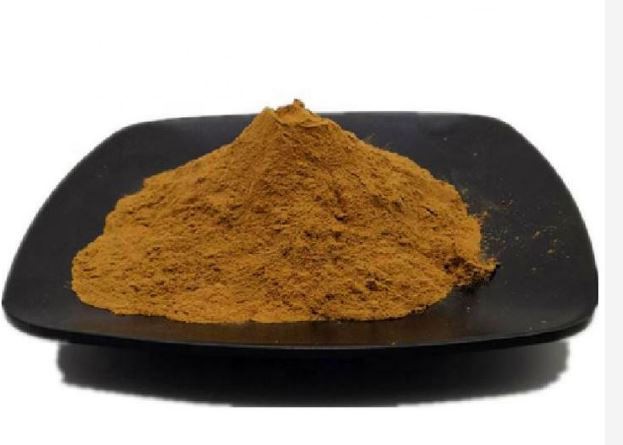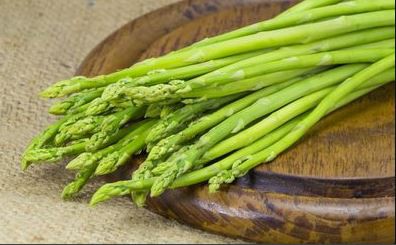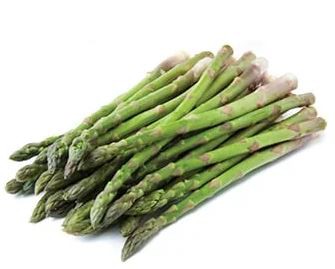What is Asparagus Root Extract?
Asparagus is a plant. The newly formed shoots (spears), root, and "underground stems" (rhizomes) are used to make medicine. The shoots are also used as a food source.
Asparagus root extract is used along with lots of fluids as "irrigation therapy" to increase urine output. It is also used for bladder infections (urinary tract infections), joint pain, obesity, and many other conditions, but there is no good scientific evidence to support these uses.
In foods, asparagus spears are eaten as a vegetable. This can produce a pungent odor in the urine in some people. The seed and wild asparagus root extract are used in alcoholic beverages.

Basic Information:
Product Name: | Asparagus extract | |
Botanic Name: | Asparagus officinalis L. | |
Plant Part: | Root | |
Solvent extraction | Water | |
Country of Origin: | China | |
ANALYSIS ITEMS | SPECIFICATION | TEST METHOD |
Appearance | Fine powder | Organoleptic |
Color | Brown | Visual |
Odour | Characteristic | Organoleptic |
Identification | Identical to R.S. sample | HPTLC |
| Extract Ratio | 4:1 | |
Hydrocarbons PAHs | Less than 50ppb | GC-MS |
Benzo(a)pyren | ≤ 10 µg/kg | |
Sieve Analysis | 100% through 80 mesh | USP39 <786> |
Water (KF) | ≤ 5.0% | Eur.Ph.8.0 [2.5.12] |

Asparagus Root Extract Benefits
1.Maintains Homocysteine Level
Asparagus root extract is rich in B vitamins that help in maintaining healthy levels of homocysteine, which is produced in the blood when an amino acid (methionine) breaks down in the body. Vitamin B, especially folate, B6, and B12 play a key role in converting homocysteine into cysteine, which then gets converted back to methionine as per the normal methylation cycle.
A deficiency of vitamin B in the body can elevate the levels of homocysteine and increase the risk of damage to blood vessels, venous thrombosis in which clotting of blood happens in the veins, atherosclerosis, and other cardiac disorders. In addition to this, vitamin B helps in maintaining healthy levels of blood sugar by ensuring proper metabolism of starches and sugars in the body.
2.Helps in Pregnancy
The high folate content in asparagus aids in reducing the danger of low birth weight and birth defects during pregnancy. Folate is essential for the growth of the fetus. It also helps in reducing the complication of edema or retention of water in the body tissues owing to its diuretic effect.
3.Fights PMS
An asparagus root extract can be used effectively for easing pre-menstrual bloating. The presence of essential nutrients helps to combat depression and fatigue, as well as reduce menstrual cramps. It also helps in controlling blood loss and maintaining hormonal balance during menstruation.
4.Reduces Blood Pressure
Asparagus is a common vegetable, long used as herbal medicine. It is effective in eradicating a plethora of health-related problems. According to a study in the Journal of Traditional and Complementary Medicine, the bottom-stem consumption of asparagus significantly reduced the subjects’ systolic and diastolic blood pressure. This result supports the possibility that asparagus cladophylls and bottom-stems differentially improve hypertension and hyperglycemia.
5.Improves Fertility
The root of asparagus racemosus is widely appreciated in Ayurvedic therapy and is famously known as Shatavari, which means ‘one who has 100 husbands’. Shatavari has aphrodisiac properties and is used to regulate the hormones and cure male and female sexual disorders. It has properties and helps in curing physical and mental debility in males. It also helps in enhancing the libido and boosts sperm count and its motility. In females, asparagus has been proven to be effective in menopausal syndrome and anemia. Shatavari has been trusted as a galactagogue and is also valued for its effectiveness in improving the quality and quantity of breast milk while boosting the appetite of nursing women. Research studies conducted on animals have demonstrated positive effects on the genitals and the mammary glands of the female subjects who consumed adequate amounts of asparagus.
6.Improves Digestion
Wild asparagus root extract contains significant quantities of the nutrient inulin, which is a kind of complex carbohydrate, commonly known as prebiotic. It does not get digested until it reaches the large intestine, where it is fed upon by a kind of good bacteria like lactobacilli. Inulin aids in the improved absorption of nutrients.
It is also a good provider of dietary fiber and has laxative properties that help in the smooth functioning of the bowels, keeping bloating and constipation at bay. Along with healthy digestion, fiber also helps in lowering the cholesterol levels of the body. It is widely recommended in Ayurveda therapy for its effectiveness in curing diarrhea, dysentery, and dyspepsia, which is a feeling of abdominal uneasiness including burning sensations or navel pain occurring during or after eating. Studies have shown that asparagus racemosus has been proven to be as effective as the commercially available modern drugs in treating dyspepsia.
7. Potential
According to a study published in Cancer Letters, crude saponins found in the shoots of asparagus have exhibited activity. A 2016 study published in the Journal of Functional Foods also found that saponins induced typical features of apoptosis. The takeaways from this study could offer a potential dietary intervention strategy to manage human colorectal cancer cells. Furthermore, asparagus also helps in elevating the levels of glutathione, an and detoxifying compound.
8.Helps in Weight Loss
According to a study in the Phytotherapy Research journal, supplementary intake of Sambucus nigra and Asparagus Officinalis facilitated improvement in the mean weight, blood pressure, physical and emotional well-being, and the quality of life of the participants.
9.Anti-diabetic Properties
As per a 2012 study published in The British Journal of Nutrition, asparagus extract has anti-diabetic properties and improves insulin secretion. Also, in another rat study published in the Indian Journal of Experimental Biology, asparagus improves early diabetic nephropathy (a kidney disease).
10.Relieves Hangovers
Wild asparagus root extract contains essential amino acids that may prove effective in curing hangovers. A hangover refers to the unpleasant physiological effect caused due to the substantial consumption of alcoholic drinks. Its symptoms include anxiety, fatigue, and stomach disorders like nausea, vomiting, and dehydration. Research studies have demonstrated that the leaves and shoots of asparagus contain a good amount of inorganic mineral content, which also aids in the protection of the liver cells from the toxic effects of alcohol.
11.Eye Care
Asparagus is a good source of vitamin A, which is essential for healthy vision. Due to the presence of s, it helps in defending the retina from the damage caused by the oxygen-free radicals. The presence of the amino acid glutathione in it also helps in reducing the risk of eye ailments such as cataracts and night blindness.
12.Treats Rheumatism
Rheumatoid arthritis is a chronic condition that causes inflammation of the joints. Studies have shown that the consumption of folate-rich food like asparagus, which also possesses properties, may help to relieve the pain and ease the overall poor functioning in the body associated with arthritis.
13.Rich in Rutin
Asparagus is also a rich source of rutin, a flavonoid that possesses properties and is used to treat hemorrhoids and prevent clotting of blood. It enhances the permeability of capillaries, strengthens the blood vessels, and protects them from becoming fragile. Rutin also prevents the hardening of arteries by reducing the viscosity of blood and helps in easing hypertension, reducing cholesterol, and maintaining cardiovascular health.
14.Neuroprotective Properties
Studies have provided evidence that asparagus racemosus is effective in reducing the risk of neurodegenerative diseases like Alzheimer’s, Parkinson’s, and Huntington’s diseases. These beneficial effects are attributed to the presence of phytoestrogens in it that have certain neuroprotective effects. Neurodegenerative diseases are genetic or periodic conditions affecting the neurons of the human brain and the body does not normally have the ability to replace the damaged neurons.
15.Relieves Depression
Scientific research has shown the efficacy of asparagus racemosus as an and drug. It helps in enhancing the memory, increases the production, and secretion of estrogen, and has a revitalizing and calming effect on the nervous system.
16.Gives Relief from Epilepsy Symptoms
Epilepsy is a chronic disorder that affects the brain and leads to recurrent convulsions or seizures. The brain transmits abnormal signals as a result of irreversible changes in the brain tissues. The roots of asparagus racemosus may provide relief from the symptoms of epilepsy. A 2016 research published in Epilepsy & Behavior suggests that asparagus racemosus extract may provide relief from PTZ induced seizure and memory issues.
17.Treats Urinary Tract Infections
Research studies show that asparagus racemosus possess an anti-urolithiatic effect, which helps to treat urinary tract infections. Due to the vegetable’s diuretic properties, the consumption of asparagus increases the frequency and volume of urination. This helps to detoxify and flush the toxic waste out of the body. According to research, the anti-urolithiatic effect can be attributed to the presence of s and essential vitamins C and E.
It is also known to give a peculiar, pungent smell to the urine, which is completely normal. This is because asparagus breaks down its constituents of ammonia and sulfur into volatile chemical compounds that actually help the body to detoxify.
18.Maintains Blood Cholesterol Level
Studies have supported the fact that the wealth of s in asparagus has the potential to treat oxidative stress, along with other disorders such as hyperlipidemia and hypercholesterolemia. These diseases indicate the presence of high fat and cholesterol content in the body, which can further pose a major threat to fatal conditions like cardiovascular diseases and atherosclerosis.
19.Culinary Uses of Asparagus
Asparagus has a delicate flavor and can be eaten raw, grilled or roasted. It can be added as an ingredient to pickles, salad recipes, and soups. The shoots of this plant are relished as an appetizer and are prepared in different ways around the world. It requires minimal cooking, which gave birth to a famous Roman saying, “As quick as cooking asparagus”, for anything that has to be done quickly.

Asparagus Root Extract Application:
1.Pharmaceutical health care products
2.Health supplements
3.Infant food, solid beverage, dairy products, instant food, snack food, spice, middle-aged and old food, baking food, snack food, cold food cold drinks, etc.
Contact us:
Phone:+16263716327
Email: [email protected]
Hot Tags: asparagus root extract, suppliers, manufacturers, factory, wholesale, buy, price, quotation
Curated Products
Provide Curated Products for all product over $100
Handmade
We ensure the product quality that is our main goal
Natural Food
Return product within 3 days for any product you buy
Free home delivery
We ensure the product quality that you can trust easily






